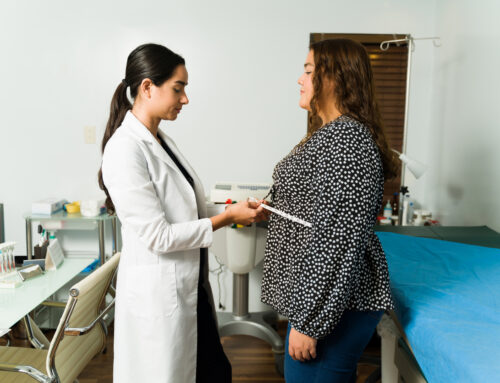Understanding how sexually transmitted diseases (STDs) can impact pregnancy is a crucial topic for expectant parents and anyone hoping to conceive. STDs like gonorrhea, chlamydia, and others without visible symptoms can affect both maternal health and fetal development, often leading to complications if left untreated.
By addressing this topic openly, TopLine MD Alliance aims to empower parents-to-be with the knowledge they need to protect their reproductive health and the well-being of their baby. Thankfully, many STDs are treatable and manageable, especially when detected early.
Keep reading to learn how certain STDs can affect pregnancy, the importance of early STD screening and treatment, and when to consult a healthcare provider. With top-tier OB/GYNs, gynecologists, fertility centers, perinatal centers, and many other women’s health specialists in our network, TopLine MD Alliance offers everything you need to have a safe and healthy pregnancy.
What are STDs?
An STD is an infection you can get from having unprotected sex (including vaginal, anal, or oral sex) or intimate physical contact (such as genital touching or kissing) with someone who is infected. You can also get an STD by sharing needles or other items that come in contact with bodily fluids from someone who is infected.
The Centers for Disease Control and Prevention (CDC) estimates that one of every five people in the United States has an STD on any given day – yet many of these people don’t know they are infected because they have no visible symptoms.
The most common STDs that affect pregnancy include:
- Gonorrhea
- Chlamydia
- Syphilis
- Genital herpes
- Hepatitis B
- HIV
Are pregnant women protected from STDs?
Unfortunately, no. You can still get an STD even if you’re pregnant – being pregnant doesn’t prevent you from being infected. You can also pass on certain STDs to your baby during pregnancy, labor, birth, and breastfeeding.
Early pregnancy screenings should include STDs
Early pregnancy screenings are designed to identify potential risks for both mother and baby, typically through blood tests and ultrasounds. These screenings cover a wide range of conditions, from genetic disorders like Down syndrome to birth defects.
All pregnant women should also be screened for STDs, including gonorrhea, chlamydia, syphilis, and HIV, during their first prenatal visit. Your provider may also recommend retesting toward the end of your pregnancy based on your risk factors.
If you have unprotected sex after your initial STD screening, ask your TopLine MD Alliance network provider for another screening before you give birth.
Preventing STDs while pregnant
The very best way to protect your baby from STDs is to protect yourself as well. Here are some things you can do to reduce your risk – and your baby’s risk – for infection during pregnancy:
- Abstain from sex – Don’t have vaginal, oral, or anal sex or engage in intimate physical contact.
- Limit your sex partners – Have sex with only one person who doesn’t have any other sex partners.
- Use a condom every time you have sex – Latex condoms with spermicide are the best birth control method for blocking sperm and preventing STDs.
- Don’t share items – Never use needles, syringes, razors, or other things that may come in contact with someone else’s bodily fluids.
- Go to all your prenatal care checkups – Even if you’re feeling fine, you could have an STD and not know it.
- Get tested and treated ASAP – Early testing and treatment reduce the risk of passing an STD to your baby. Ask your partner to get tested and treated, too – you can get re-infected if your partner has an STD.
- Ask your doctor about vaccinations – Vaccinations can help protect you from STDs like hepatitis B and HPV. You may still be able to get vaccinated during pregnancy.
What STD symptoms should pregnant women watch for?
Again, many STDs have no symptoms. That’s why the CDC recommends that all young adults under age 25 get screened annually, pregnant or not. Adults over age 25 should also be screened if they have any risk factors or might have been exposed.
Of course, pregnant women are caring for two. In addition to prenatal checkups and STD screenings, watch for any of the following symptoms:
- Burning, itching, redness, or swelling in the vaginal area
- Heavy or foul-smelling discharge in the vaginal area
- Pain, discharge, or bleeding in the rectum
- Painful bowel movements
- Painful urination
- Pain during sex
- Bleeding after sex
- Bumps, sores, or warts near your mouth, vaginal, or anal area
- Flu-like symptoms, including fever, chills, headache, and fatigue
- Belly pain
- Eye infections
- Yellow skin
If you suspect you might have an STD, contact your TopLine MD Alliance network provider right away for testing and treatment.
The risks of untreated STDs during pregnancy
Different STDs have different potential impacts on the health of the mother and baby. Let’s take a closer look at how specific STDs can affect your pregnancy.
Gonorrhea
Gonorrhea is on the rise and is often symptom-free. If you do have symptoms, you might mistake them for a urinary tract infection, yeast infection, or something similar.
Untreated gonorrhea during pregnancy is linked to:
- Miscarriage
- Water breaking early
- Preterm birth
- Low birth weight
- Chorioamnionitis (a bacterial infection of the membranes surrounding the baby and the amniotic fluid)
Babies exposed to gonorrhea can also develop:
- Blindness
- Eye infections
- Blood infections
- Joint infections
If you test positive for gonorrhea during pregnancy, your TopLine MD Alliance network provider can treat you with antibiotics and use antibiotic eye ointment on your newborn to prevent infections.
Chlamydia
Chlamydia, which is also usually symptom-free, is the most frequently reported STD in the United States. Like gonorrhea, chlamydia puts pregnant women at risk for:
- Water breaking early
- Preterm birth
- Low birth weight
You can pass chlamydia to your newborn during childbirth, even if you deliver by cesarean section (c-section). Babies who are exposed to chlamydia may develop pink eye, pneumonia, or other complications.
After testing positive, your provider can also treat chlamydia with antibiotics for you and antibiotic eye ointment for your newborn.
Syphilis
Syphilis is another contagious STD that can easily be passed to your baby, causing fatal infections or preterm birth. Syphilis can also cause problems with your baby’s eyes, ears, heart, skin, and bones.
Due to latent syphilis (which has no symptoms), there has been a rise in infected newborns and deaths in the womb. Because of these risks, your TopLine MD Alliance network provider will screen you for syphilis at your first prenatal visit. If you are high risk, you may be rescreened again later in your pregnancy.
Syphilis is treated with antibiotics.
Genital herpes
Genital herpes is a lifelong condition. While it doesn’t affect fetal development, active herpes lesions are contagious and can be passed to your baby during childbirth. Exposure to herpes puts your newborn at risk for:
- Blindness
- Brain damage
- Skin infections
- If left untreated, death
It’s very important to tell your TopLine MD Alliance network provider if you have herpes. To help prevent an outbreak during delivery, you will likely start taking a daily antiviral medication at 36 weeks. Your provider will also likely recommend a C-section for delivery.
Hepatitis B
If you have hepatitis B while you are pregnant, you can transmit the infection to the baby through your placenta. Hepatitis B also increases your chances of premature birth.
After delivery, your provider will likely give your newborn an injection of antibodies and a hepatitis B vaccine to prevent them from becoming infected.
HIV
If you are HIV-positive, it’s now possible to prevent transmitting the virus to your baby. When your viral load is undetectable, there’s a less than 1% chance. However, you must follow your HIV treatment plan closely throughout your pregnancy, including antiretroviral therapy.
HIV can also be transmitted by breast milk. Taking antiretroviral therapy medications greatly reduces the risk, but your provider may recommend using baby formula instead.
Are STD treatments safe during pregnancy?
Yes, the treatments listed above are generally safe during pregnancy, especially for bacterial STDs like chlamydia, gonorrhea, and syphilis. These infections are typically treated with antibiotics.
While there’s no cure for viral STDs like genital herpes and HIV, antiviral medications are also safe and reduce the risk of transmission to the baby.
STDs and future fertility
Here’s another excellent reason to get tested for STDs – left untreated, many STDs can negatively impact your ability to get pregnant again.
For instance, untreated gonorrhea and chlamydia can lead to pelvic inflammatory disease (PID), which may cause inflammation and scarring in your fallopian tubes. This damage will likely make it harder for sperm to reach an egg and for a fertilized egg to travel to your uterus. It also increases your risk for ectopic pregnancy (when a fertilized egg implants outside the uterus), which always ends in pregnancy loss.
Other untreated STDs can affect your partner’s sperm quality and mobility, further impacting future fertility.
Your trusted resource for pregnancy care
TopLine MD Alliance was created by physicians who came together to make healthcare experiences better for patients. We help patients navigate the healthcare system, connecting them with top-tier providers, practices, diagnostic centers, and imaging centers we trust.
Whether you are pregnant now or hope to be soon, TopLine MD Alliance delivers the high-quality care and exceptional service you deserve. To learn more, visit us online and find a provider today.
The TopLine MD Alliance is an association of independent physicians and medical practice groups who are committed to providing a higher standard of healthcare services. The members of the TopLine MD Alliance have no legal or financial relationship with one another. The TopLine MD Alliance brand has no formal corporate, financial or legal ties to any of the affiliated physicians or practice groups.




